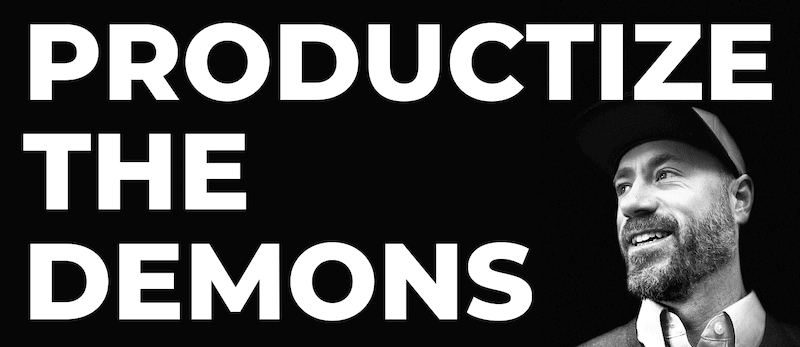
Running a client-based business can be a rollercoaster. One minute you’re riding high on that big project you just won. The next, you’re dog cussing your chosen profession and questioning why you ever agreed to work with that unreasonable client where it’s Never Enough.
Don’t point fingers at the client who hired you. That dumpster fire is most likely your fault. And if things always go south with clients, you’re either the world’s most unlucky entrepreneur, or you’ve got some flaws in what you’re doing.
I speak from personal experience. I kept blaming clients when projects would end in frustration. It was after some serious reflection about 8 years ago that I realized we were the problem, not out clients. The good news, your frustrations are most likely caused by one of three things (or possibly all three) that you can fix.
Problem 1: You lack focus.
You’re offering every possible service to everyone in the world. You’re constantly jumping between vastly different projects. It’s impossible to scale a business that’s doing something entirely different each day. This is a stressful way to work that leaves you and your clients frustrated with mediocre results.
Problem 2: You charge hourly.
If you price hourly, you own a job, not a business. Hourly pricing penalizes you for becoming more efficient and frustrates your clients with surprises on invoices. You want clients focused on the fantastic end result you’re going to provide, not how many hours are on your invoice.
Hourly pricing associates you with low-level expertise. You wouldn’t pay a CEO, CTO, CMO, or any other C_O position hourly. The only people paid hourly in an organization are the lowest level employees. Why position yourself like the people that are most replaceable and the least appreciated?
Problem 3: You don’t charge enough.
It’s better to pass on a project than cut your rates. I know it’s tempting to agree to cut your rates to win a project, but a client who starts the relationship negotiating for discounts isn’t someone you want. They’ll eat up your bandwidth and make it hard for you to deliver when a great client with money does come along. You’re better walking away and aggressively pursuing new business that’s a better fit.
Discounted projects rarely have happy endings. You start to regret your decision and resent the client. They start to feel neglected—because you are neglecting them—and everything blows up in your face.
Productize around a solution to get scale.
The first step to curing the above maladies is repositioning your business around a solution. What are the people hiring you looking to achieve? What do they believe hiring you will help them do?
Define the problem you’re solving and reposition your entire business around this solution. Make it easy for someone considering your business to see how hiring you will take them from where they are today to where they want to be in the future. Ask yourself the following questions if you’re struggling to narrow down your focus to a specific target client and problem.
The Good
- Which clients have been most pleased with what you provided in the past?
- What was the problem you solved for them?
- What did each project have in common?
- Are there more people out there like these people?
- Can you get the same results for these other people?
The Bad
- Which projects did you hate the most?
- What did each awful project have in common?
- What did the clients of these projects have in common?
Going through these questions will help you vocalize the difference between good and bad clients and projects. Define the bad and then cut them out of your life like a pesky weed. Focus your time, attention, and efforts on attracting the good. It really is that simple. Don’t overthink or overcomplicate this step.
Now develop a product that solves the defined problem for good clients. Don’t offer hours or services, build a product around the solution they’re seeking. Products are easier to sell, are paid for in advance, and can be systematized for consistency. All of these facts lead to a service business that can be scaled.
A product in this case doesn’t mean something you can hold like a new pair of Jordans. It’s more of a shift in how you position your offering. We want to go from a focus on what you’re giving (time, services, etc…) to painting a picture of what the client is getting (the wonderful end result they’re seeking).
As an example, let’s pretend you’re a writer that specializes in blog content. Rather than offering hourly writing services for blog posts, build a “Blog Growth System” that guarantees one high-quality blog post each week. You’re still offering the same thing (writing), but you’re selling peace of mind and results rather than hours. Clients will be thrilled knowing that they don’t have to worry about their blog, and you’ll be able to enjoy a scalable business model that generates recurring revenue.
Just be warned…
The service business gods have a way of knowing that you’re trying to focus and they’ll test your resolve. The second you commit to a niche and say you’re not going to discount your new product, they’ll send a project in your door that goes against everything you’ve defined. It’ll probably be a large client that looks a lot like those bad clients you defined above. They’ll want you to take on services that don’t fit your focus, but they have a big fat budget to give you if you discount this first project to prove yourself.
Will you have the resolve to turn the project away, or will you cave to the pressure? I won’t tell you to say yes or no. The decision is yours and I empathize with the need to put money in the bank and food on the table. I honestly understand if you decide to accept the project.
That said, keep in mind why you’re reading this article in the first place. You’ve struggled with bad clients and the inability to scale your business. Maybe it’s time for a change. Productizing around a solution could be the magical shift that takes you from owning a frustrating job to running a scalable business.
I’d say it’s worth giving it a shot.
If you’re serious about scaling your service business, sign up for The Recipe. It’s my weekly email where I deliver branding, marketing, and growth tips for b2b and service companies.
